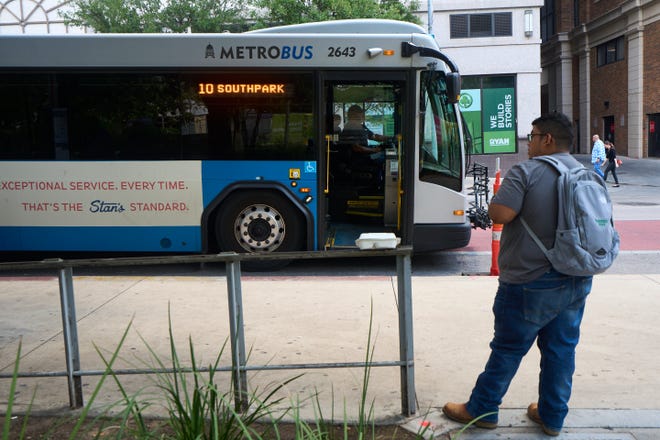CapMetro board advances plans for Pleasant Valley, Expo Center rapid-bus routes
 Chase Rogers
Chase Rogers
Capital Metro's governing board on Monday approved a land purchase and agreements for new park-and-ride sites to cap the ends of two proposed rapid-bus routes, advancing the Project Connect-funded mobility projects initially planned for a 2023 rollout.
Shipping delays and planning shortcomings resulted in a two-year delay, with the two routes — the Pleasant Valley MetroRapid and Expo Center MetroRapid — slated to come online in 2025. Both new routes would be served by fully electric buses with pickups as frequent as every 10 minutes.
In unanimous votes, the board approved a $20.7 million construction contract to build a park-and-ride facility on the Expo Center line and a $2 million purchase of a 1.79-acre tract of land for the future Goodnight Ranch Park-and-Ride site on the Pleasant Valley line.
The Expo Center MetroRapid is an approximately 12-mile line running along Trinity Street, San Jacinto Boulevard and Manor Road from the Travis County Exposition Center through Northeast Austin and to downtown. The line would serve "key activity centers," according to project documents, including downtown Austin, the University of Texas, Dell Seton Medical Center, St. David’s Medical Center and Dell Children’s Medical Center.
The Pleasant Valley MetroRapid is a roughly 15-mile line east of Interstate 35 along the East William Cannon Drive, Pleasant Valley Road and Airport Boulevard corridors — some of the highest ridership corridors in the Austin-area transit system, according to briefing documents given to board members.

Voters approved Project Connect in 2020 by a more than 15-percentage-point margin, raising the ad valorem property tax rate by 8.75 cents — an increase to the city's property tax rate by more than 20%. The new tax would go toward transforming the city's transit map with a new centerpiece light-rail system, four high-frequency bus routes — including the Pleasant Valley and Expo Center lines — and other improvements.
The Goodnight Ranch Park-and-Ride facility, on Slaughter Lane, will include four bus bays outfitted with charging equipment for the all-electric fleet using the line and 64 parking spaces for users, according to briefing materials.
Once built, the site — the land for which CapMetro will purchase from Goodnight Ranch LP, the developer of the nearby 700-acre mixed-use community of the same name near I-35 and Slaughter Lane in Southeast Austin — will be the southernmost park-and-ride lot in the Austin-area system, offering riders connections to medical, retail and educational facilities, including Austin Community College's Eastview Campus.

The Expo Center Park-and-Ride site, located on Decker Lane, will include eight bus bays outfitted with the same charging equipment and 144 parking spaces, according to briefing materials.
CapMetro staff recommended M.A. Smith Contracting Company Inc. to build the park-and-ride. The Austin-area contractor will build the site for $17.3 million with a $3.4 million contingency — about 20% — for a total amount not to exceed $20.7 million, according to briefing documents.

The future of Project Connect's funding model is subject to a pending bond validation lawsuit filed by the Austin Transit Partnership, the city's light-rail planning agency. The agency's lawsuit was consolidated with one filed last fall by critics of the transportation investment. A trial is set for late May.
CapMetro has received some federal funds for the two new MetroRapid lines. Last March, the Federal Transit Administration announced it would award $65.6 million to the transit agency to split between the two new lines, covering more than 60% of the costs for each.